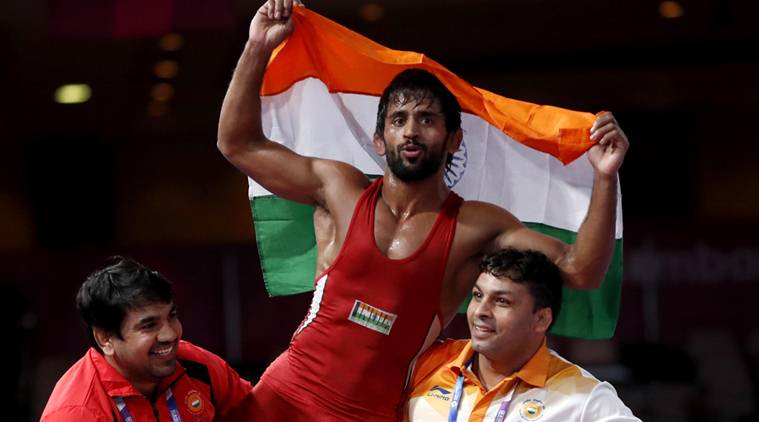 Asian Games 2018: Bajrang Punia of India celebrates after winning gold medal. (Source: Reuters)
Asian Games 2018: Bajrang Punia of India celebrates after winning gold medal. (Source: Reuters)
India’s first gold medal at the Asian Games came with a rider: rest on these laurels at your own peril. The Tokyo travel advisory should probably read: It’s a jungle out there in two years’ time.
The Bajrang Punia-Takatani Daichi 65 kg final was a mongoose hunting down a snake, complete with the slithering and bared fangs, choke-holds and desperate escapes. The 24-year-old from Haryana triumphed 11-8 in a final that will go down as a classic in India’s modern wrestling history for the battle of wits and brawn that tested his every sinew. But the military man from Tokyo — a contender as tenacious as Bajrang — will be waiting when 2020 comes around.
Bajrang is India’s fastest, most powerful and focussed grappler at the moment. His fitness has been a revelation over the past few seasons, something that keeps him in the game until the last second. Still, he would not have expected that testimonial to his tenacity to be summoned to the last gasping moment on the way to winning one of the biggest finals of his life so far.
 Bajrang Punia poses with his gold medal after winning freestyle wrestling (65kg) against Japan’s Daichi Takatani. (PTI Photo)
Bajrang Punia poses with his gold medal after winning freestyle wrestling (65kg) against Japan’s Daichi Takatani. (PTI Photo)
Bajrang, top-ranked in Jakarta, was lined up against a rival who had beaten him in the Asian Championship — which had the same set of grapplers as here, but minus the noise. The rest of the Indian contingent was wiped out early, and the gold hope rested squarely on Bajrang.
He was countered on the strongest aspect of his wrestling: his footwork. Bajrang prides himself on not allowing opponents to grab his ankle and unsettle him — but the Japanese raided that fortress not once but thrice to draw level with him. He foiled the attempts to flip him over on his back or shoulders by holding on to Daichi’s ankles. He managed to escape as the clock ticked away, and earn India a well deserved gold on Day 1.
“If I start thinking that I am losing, then I will definitely lose. So I never do that,” he said afterward. “No celebration, after going back, I will start preparing for the World Championship,” he added. Daichi-Bajrang Round 3 is awaited.
Back in the Punia family home in Sonepat and in Bajrang’s village Khuddan in Haryana’s Jhajjar district, though, it was celebration time.
“I was a university-level wrestler and Bajrang’s elder brother Harender, too, wrestled. We owned a three-acre farm in our village then, and Bajrang went to the local akhadas. In 2005, we enrolled him at the Lala Diwan Chand Akhara in Chhara village, 35 km from our village. Iska din subah teen baje start hota tha tab, aur aaj bhi yahi aadat hai. (His day began at 3 am then, and he still follows that schedule.) Desh ka pehla gold medal jeet ke Bajrang ne purey desh ko yeh tohfa diya hai. (Bajrang has given the country a gift by winning India’s first gold),” said 66-year-old Balwan Singh Punia, Bajrang’s father. —(With Nitin Sharma, Chandigarh)